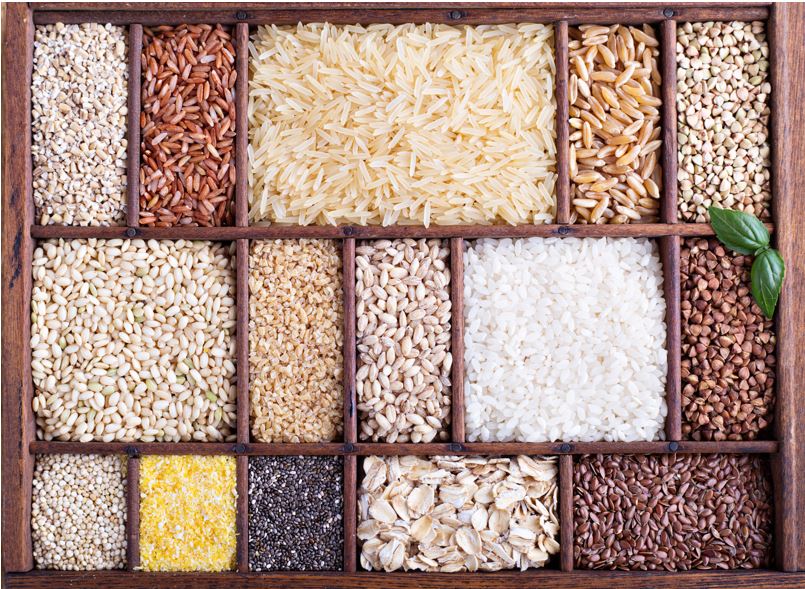The recent edition of the Dietary Guidelines for Americans (2020-2025) continues to support the need to replace refined grains in our diets with whole grains. The recommendation is that at least a half of all grains eaten should be whole grains. While a similar recommendation has been a part of past guidelines, less than 2% of the US population eats the recommended amount of whole grains. Aim for about 3-4 ounces of whole grains per day for adults and 1 ½ to 2 ½ ounces of whole grains per day for kids 8 years and younger.
Most people’s grain intake is refined grains that come from combination or mixed ingredient foods such as sandwiches, pizza, cakes, cookies, snacks, and sweets. On the other hand, most whole grain consumption comes from individual food items such as cereals and crackers.
In addition to increased overall nutrient density, eating whole grains can increase fiber intake while helping with heart health, reducing risk of some cancers, aiding good digestion, and helping people maintain a healthy weight.
Take some time this month to evaluate the grains in your (and your family’s) diets. What types of overall grains are you eating? Are whole grains included? Do you need to make some changes? Set some goals for yourself!
Here are some ideas for how to get some whole grains into your eating pattern:
- Take time to shop. Plan some extra time for label reading at the grocery store. Perhaps some of the foods that you thought contained whole grains really don’t. You may also be surprised to find lots of “extra” ingredients like salt, sugar, and fats in prepared grain products.
- Seek out whole grains. While at the store, find where whole grain products are located. They may be in the cereal section, with the crackers and snacks or next to rice and beans. Check the freezer section, too. Not finding much? Do a search on the internet for sources of whole grains, delivered.
- Plan a field trip. Some of the more traditional grocery stores may not have a large variety whole grains and whole grain products. Go to a bulk food, specialty store or food co-op that sells more unique or exotic whole grain products. Select a few to try.
- Include everyone. Have each family member pick a whole grain product that they would like to try, find a recipe to use it, and then have special whole grain meals.
- Every meal counts. Look for great ways that whole grains can be added to every meal of the day. Aim for three whole grain foods every day.
- Double your pleasure. Bowl meals are popular — create one using two different whole grains (like barley and wild rice or brown rice and quinoa) then top your bowl with raw or cooked veggies and a favorite lean protein.
- Experiment. Set a goal to try 2 (or 4 or 6) new grains this month. Think of something you haven’t tried before. How about amaranth, farro, or millet? You can find cooking ideas and hacks online.
- Reach for different bread. Instead of your regular bread selections, seek out something different that contains whole grains: pita, tortilla, naan, or sandwich buns or rolls. Look for labels that say 100% whole grain.
- Select salads. Whole grains don’t need to just be pilafs or hot side dishes. Try a whole grain salad like Quinoa and Strawberries or Chicken and Rice Salad.
- Do-it-yourself. Add whole grains to your baking. Oatmeal cookies count! Or you can swap whole wheat flour for half of the all-purpose flour in your favorite bread recipe.
The Whole Grains Council declared March 31, 2021 as Whole Grain Sampling Day. Post photos of you eating or serving a whole grain food and share how you got more whole grains this month. Use the hashtag #SampleWholeGrains.
By Cheryle Jones Syracuse, MS
Copyright foodandhealth.com, reprinted with permission.

